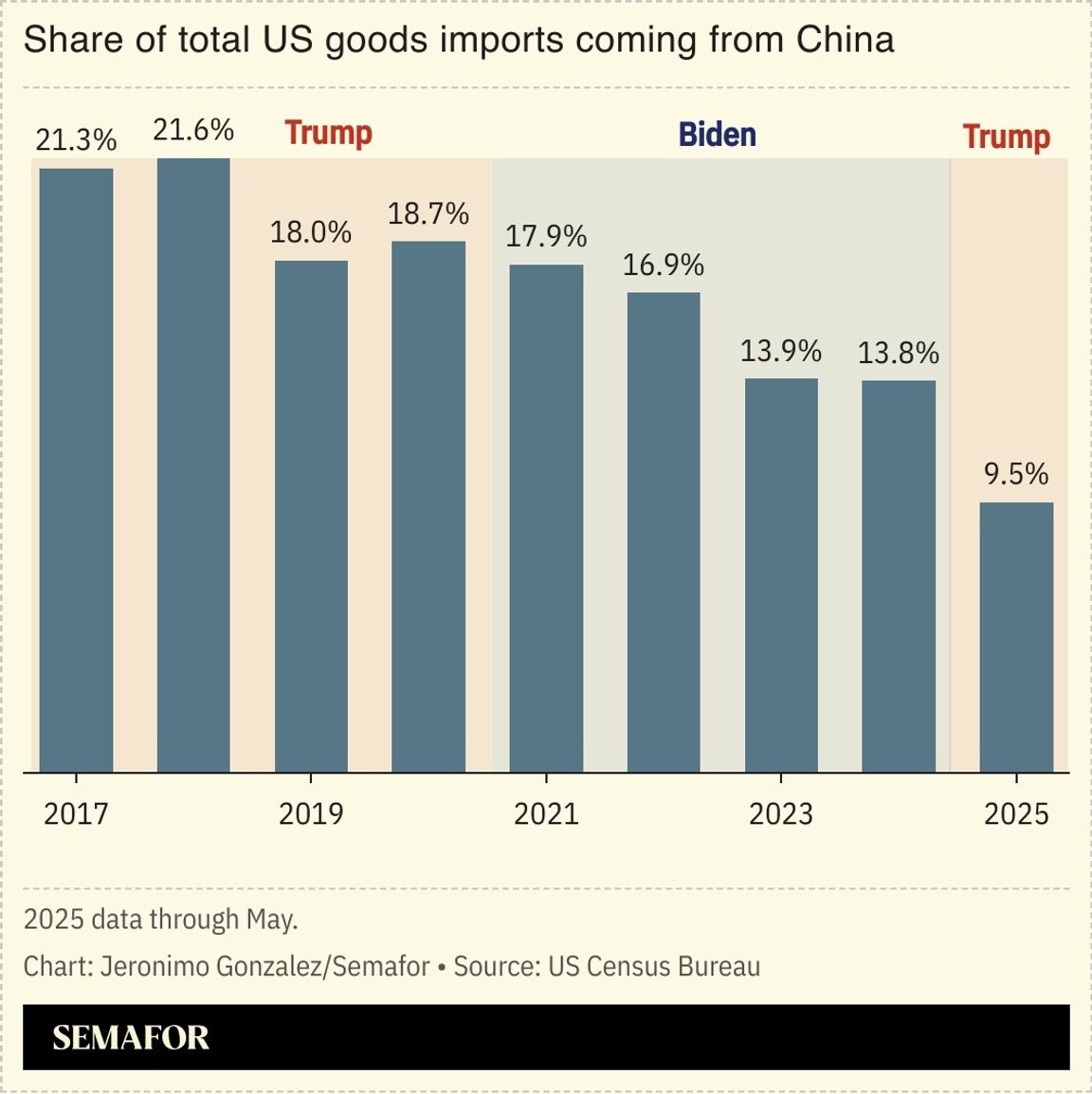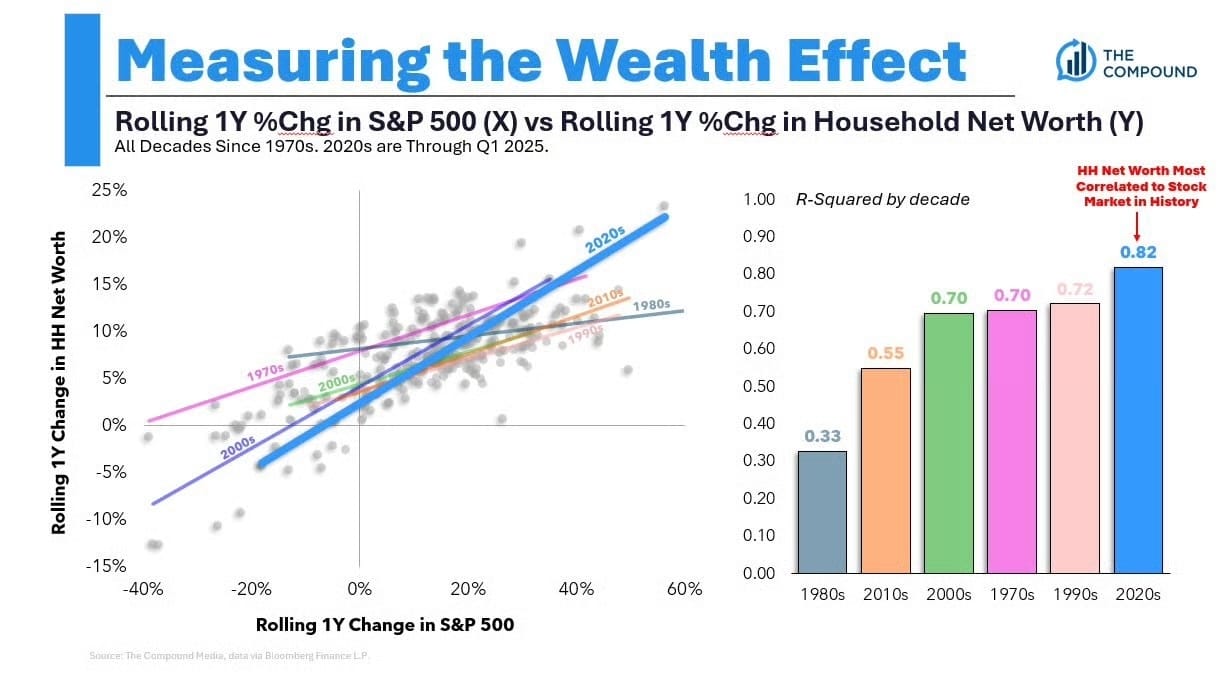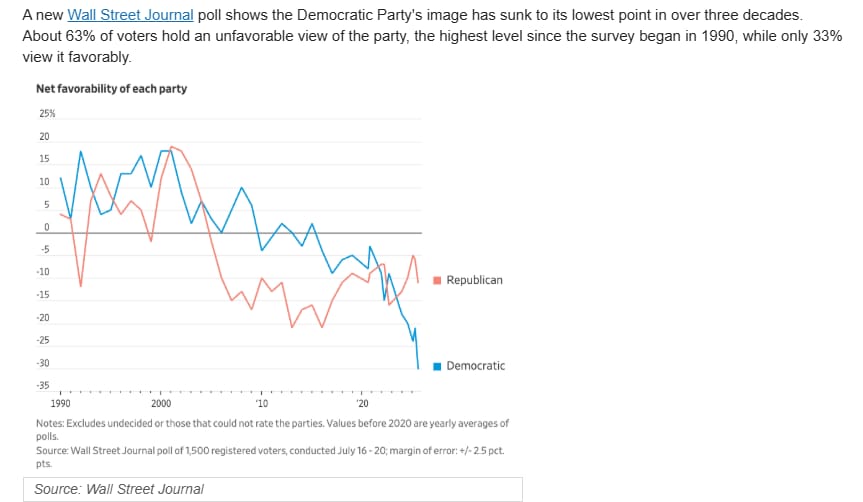- TOPLEY'S TOP 10
- Posts
- SMARTER IN 10
SMARTER IN 10
U.S. is Barely Growing Outside of AI Investments

2….
…
2. U.S. Imports from China Have Been Cut in Half
Trade limbo persists.
An extension of the Washington-Beijing tariff detente remains subject to US President Donald Trump’s approval, one of several deals which are in limbo. Chinese negotiators earlier said the two sides agreed to a 90-day extension of their truce, but Washington said it hadn’t yet “given the sign off.” With a tariff reprieve expiring Friday, details over a US-European Union agreement have also been disputed, tariffs on India remain unclear, and African economies are awaiting news. Their dependence on Trump’s whims means “these deals don’t yet represent a new trade order,” The Wall Street Journal’s chief economics commentator wrote. “They are sort of a way station, more fragile and with less legitimacy than the system they have supplanted.”
…
…
4. Americans Net Worth the Most Correlated to Stock Market in History
Wealth effect. "The correlation between U.S. household wealth and the stock market is the highest in history … Trendlines are shown by decade. R-Squared is highest for the 2020s."
…
…
6. Real Estate Friday
Single Family Homes for Sale in South Above 2008 Levels. In the South, dominated by Texas and Florida, inventories of new houses for sale spiked to a record of 312,000 in June, up by 6.5% from the already above-Housing-Bust-peak level a year ago, and up by 78% from June 2019.
The Census region accounted for 61% of total US new-home inventory, and also for 61% of total US new-home sales (a map of the four Census regions is below the article at the top of the comments).
Sales dropped by 6% year-over-year to 33,000 new homes, and by 15% from June 2019, despite the massive incentives by homebuilders.
Housing Market Nobility-Ben Carlson
Right or wrong, our economic system invariably creates haves and have-nots.
It’s a feature not a bug.
This feature has always been more prevalent in the stock market than the housing market:
The bottom 90% owns just 12.8% of the stock market1 but 56% of the housing market. The top 1% owns 50% of the stock market and less than 14% of the housing market.
The largest financial asset for the majority of middle-class households is their home.
My worry about the current housing situation is that it’s going to make it much harder for people in the middle class to keep up.
This is already starting to show up in the data.
Baby boomers make up by far the largest share of home purchases and sales:
Older people are responsible for nearly 60% of all housing sales and close to half of all purchases. This makes sense when you consider 40% of all homeowners have no mortgage.
Boomers have tons of equity to play around with, so high prices and mortgage rates don’t matter to them as much as they do to young people.
…
…
8. Demographics are Destiny—China Closes 20,000 Kindergartens Last Year
Kiki Wang, 28, a teacher from Jiangsu, was laid off last month. “It’s not that you are not a good teacher, it’s just we don’t have enough kids,” she recalls her principal telling her. She says she doesn’t know what to do next and is posting on social media for advice. More than 20,000 kindergartens closed last year in China, with nearly 250,000 teachers losing their jobs, government data show. In China, kindergartens are akin to preschools in the U.S., serving children ages 3 to 5.
…
…
10. 4 simple food rules to stay in shape and live longer, followed by a longevity doctor who studies diet and aging
Dr. Kurt Hong researches how what a person eats affects how they age.
Hong follows the Mediterranean diet, which has been deemed the healthiest eating plan for years.
His top tip is to eat plenty of fruits, vegetables, and wholegrains but not to overeat.
As an obesity doctor, a nutrition researcher, and a professor of medicine and aging, Kurt Hong has dedicated his life to understanding the link between our diets and longevity and helping patients avoid diseases such as type 2 diabetes and cancer.
But his career isn't entirely selfless, he told Business Insider.
"I always joke with my wife that I also do this for selfish reasons," Hong said, "I'm always looking for ways to stay young."
To the 52-year-old father of three, age is just a number thanks to lifestyle choices we can make.
"Your body may tell you you're 52 years old, but you can behave or you can feel like a 35-year-old," he said. "And it can be the other way around as well."
He added, "A lot of the age-related chronic diseases are directly related to what you eat and your weight."
Hong's approach to harnessing our diets to age well is simple and centered on the Mediterranean diet. It consists mainly of fresh produce, whole grains, healthy fats, and lean proteins and has been voted the healthiest way to eat eight years running by the US News and World Report.
Hong, who's the chief medical officer of Lifeforce, a concierge preventive medicine company, and a professor at the University of Southern California, shared the four simple dietary rules he follows to stay healthy for as long as possible.
Eat your veggies
Hong's No. 1 piece of advice is simply to eat your fruits and vegetables. He prioritizes getting enough plants, including whole grains, in his diet because they contain fiber.Diets high in fiber are associated with a lower risk of multiple types of cancer, lower cholesterol levels, a lower risk of cardiovascular disease, and a healthy gut microbiome — the community of microbes that live in the colon lining and are thought to affect overall health.
"The other part of it is that by getting your fruits and vegetables, you also get a lot of the vitamins," Hong said.Plenty of evidence suggests that people who eat more plants are likely to be healthier than those who don't. In a 2019 study published in the Journal of the American Heart Association, which followed more than 12,000 people for 29 years, those who reported eating about four to five servings of plants a day, and little to no processed or red meat, were 18 to 25% less likely to die prematurely than those who relied more on meat and other animal products.
Eat a lot of fish
Hong's main source of animal protein is fish, because it's rich in vitamins, antioxidants, and protein. "I eat a lot of fish," he said.Wild-caught salmon, albacore tuna, and halibut are his favorites, and he mostly bakes or poaches them. Fish contains omega-3 fatty acids, which are essential for brain health. A 2024 meta-analysis published in the journal Aging Clinical and Experimental Research found that eating fish was associated with a lower risk of cognitive impairment, dementia, and Alzheimer's disease. The vitamins and minerals in fish, as well as omega-3, are thought to be brain-boosting, the authors said.
"Even if you don't eat fish daily, try for just two, three times a week," Hong said.
Don't overeat
Hong also pays attention to how much he's eating.
"You can eat all the right things, but if you still carry that extra weight, there's still a level of systemic inflammation that's contributing to your risk of chronic disease," he said. "If your body's burning 2,000 calories, but you're eating 6,000 calories of fruits and vegetables, guess what? You're still going to gain weight."
Though it's contested whether a person's size is an indicator of their health, being overweight or obese is linked to a greater risk of several health conditions, including type 2 diabetes, cardiovascular disease, and certain types of cancer.To meet his nutritional goals — which are to eat enough protein, plants, and healthy fats, while maintaining a healthy weight — Hong eats higher-calorie foods in moderation.
For example, he may grab three hard-boiled eggs for breakfast, eat the higher-protein whites, and remove the higher-calorie yolks from two.
"It allows me to hit my calorie goals a little bit easier but still allows me to make sure that I get to my protein goal as well," he said.
"So it's the right volume and also the right type of food," Hong said.
Meal prep to avoid ultra-processed foods
Ultra-processed foods are typically packaged and contain ingredients you wouldn't find in a regular kitchen. They're generally convenient and cheap, but eating lots of them has been linked to a greater risk of cardiovascular disease, diabetes, cancer, depression, and dying early from any cause.
Hong understands that it's nearly impossible to eliminate ultra-processed foods entirely because they're "everywhere." But to eat fewer UPFs, he meal preps as much as possible.
"I do still have business meetings out where I have to grab dinners and other things. But you do the best you can," he said.
For people who are time-strapped, he suggested trying out a meal delivery service.
"They'll ship it to your home, where you have to put everything together within about 20, 30 minutes. That can take away the ultra-processed component," he said.
…
Did someone forward this email to you? Get your own:
Disclosure
Indices that may be included herein are unmanaged indices and one cannot directly invest in an index. Index returns do not reflect the impact of any management fees, transaction costs or expenses. The index information included herein is for illustrative purposes only.
Material for market review represents an assessment of the market environment at a specific point in time and is not intended to be a forecast of future events, or a guarantee of future results.
Material compiled by Lansing Street Advisors is based on publicly available data at the time of compilation. Lansing Street Advisors makes no warranties or representation of any kind relating to the accuracy, completeness or timeliness of the data and shall not have liability for any damages of any kind relating to the use such data.
To the extent that content includes references to securities, those references do not constitute an offer or solicitation to buy, sell or hold such security as information is provided for educational purposes only. Articles should not be considered investment advice and the information contain within should not be relied upon in assessing whether or not to invest in any securities or asset classes mentioned. Articles have been prepared without regard to the individual financial circumstances and objectives of persons who receive it. Securities discussed may not be suitable for all investors. Please keep in mind that a company’s past financial performance, including the performance of its share price, does not guarantee future results.
Lansing Street Advisors is a registered investment adviser with the State of Pennsylvania.









